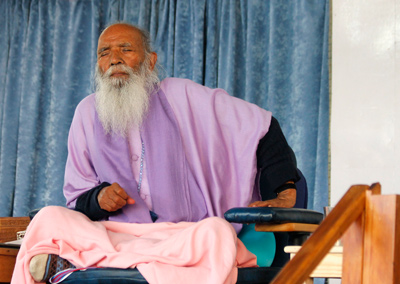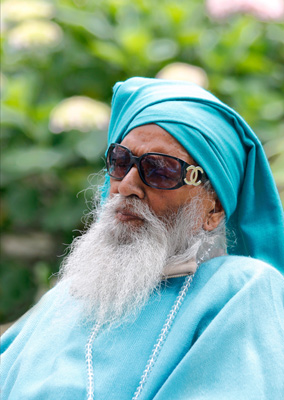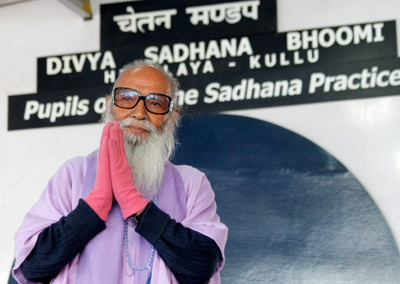This Unhappening Is Indescribable

October 23, 2015
Whenever we hear someone speak, we hear words, which nobody was born with. We hear words with that which is born. Every happening within a human being is born. But when you come over here, we can talk, which we have learned; plus, when we close the eyes, we become unborn—and then when we open the eyes, we become unborn. Unborn sees unborn. Those who have never meditated, they are born, and they hear born, see born and die in born. Since we have closed the eyes, we have become transformed—yet we still become form when we open the eyes.
You have heard me saying that this awareness, which has been realized by the realized being, was missing. Thus, it is nobody’s fault: if they are birds, they are birds; if they are animals, they are animals; if they are trees, they are trees; if they are water, they are water. All of you—who were in the stability of birth, living in years, living in time and space and dying in time and space—came with that. But you have not been told that you have joined, shared, participated in or seen a totally new Anahona—Unhappening, Unbeginning. And that, you realized.
Though you are realized, the words that you speak have no ability to reach that realization. The eyes with which you see, their seeing has no ability to reach that Unhappening. The ears, which have the ability to hear sounds, have no ability to reach that Unhappening. It is Mahan. It is not appearance, it does not live in appearance, and it does not die in appearance. Mahan can be translated as Pure. Thus, Pure is a totally new happening, which has not happened before in the lives of those people who died or who are dying. That is why this Unhappening is indescribable.
What is the description of Unhappening? Sleep cannot describe it. The dream I, the dream mind, or the whole personality of the dream senses cannot describe it. And the waking state and all its senses, mind, person and personality cannot describe it. That is why it is that Me which is Anubhav, the Self, and is everybody’s experience. Anubhav has nothing to do with born and unborn—for its description, we say it does not.
A rare one has the inquiry, “Being a human being, how should I know this,?” He is a unique person, not a person among the masses or sheep. That person is like you—everyone. If that person is deserving, he gets the answer—and not in words.
The one who is in that new happening, Unhappening, says that by birth you have the opportunity to know it, and it does not need the greatest wrestling power. You just close the eyes. During that period, your body has a jigyasa, energy or inquiry, “What is this?” The moment you see the realized one, you close the eyes, but in the beginning you interpret that it is darkness. But Guru says it is Pure, Mahan, greater than the greatest, because it does not appear in birth, it does not die in death, and it does not change in between. When I become out loud, or against your thinking-intellect, or the intellectual-mental, then I say, “Well look, it is no surprise.” Surprise is ignorance. You know that with closed eyes you do not see the world of forms that you make, or the individual that you make—the forms, forms, forms, forms. This never makes a form, never makes a name. I indicate, allude to and speak this, from this, being in this, being ever in this, not being born to think that we are many forms, forms, forms—or forms that end, end, end. If that helps you, well and good. It is never going to change and become one or many forms or names.
If this is realized, never forget it in your speech. You may use words as a born human being who has learned words. But now, fifty years later, you are not supposed to forget it. If you forget it and only talk about food and medicines, about persons who are born, who are getting married and who are dying, then such a person is wasting the time and energy of his life. If he wastes every single breath—without realizing it, without knowing it—it is not worthwhile.
In order to save your time and make your presence worthwhile, we do not compel you that you should learn it because I said to. No. If you have learned, if you have learned at least one percent, then you have learned. If you have learned ten percent, then you have learned. And today, this is one hundred per cent. This is the Truth, the Sat, and the company of Truth, the Sat—Satsang. Thank you. [Applause]
October 26, 2015
 Many of you must be wondering what is Anahota, as against happening. What is happening is a person born. When a person is not born, he is Unborn. So if a human being’s illusion, or ego-intellect-mind consciousness, works in a person born throughout his life of a hundred years, then it is illusory consciousness, or consciousness, which has never been—yet he makes that it is, that it is happening. He has been told that if he wants to be free from this, then he can use his understanding of the ego-intellect-mind to get dissolved in Unhappening, Anahota, or Unborn. So the meaning of Anahota is actually Unborn.
Many of you must be wondering what is Anahota, as against happening. What is happening is a person born. When a person is not born, he is Unborn. So if a human being’s illusion, or ego-intellect-mind consciousness, works in a person born throughout his life of a hundred years, then it is illusory consciousness, or consciousness, which has never been—yet he makes that it is, that it is happening. He has been told that if he wants to be free from this, then he can use his understanding of the ego-intellect-mind to get dissolved in Unhappening, Anahota, or Unborn. So the meaning of Anahota is actually Unborn.
The person who is hearing this is not supposed to know Anahota, or Unhappening. That is why he has to hear this—and not the persons who only know hota, happening or illusion, which is making every happening real. So he is the one who has to listen, again and again. The result will be that his ego-intellect-mind will be purified. Purified means it will not be acting as opposite, negative consciousness. Rather, it will get absorbed in that which a human being already knows with the Knower, with the knowledge that he was not born. That which is not born is like akash (space). A tree is born. In the atmosphere, all is born. Anything that is in front of the eyes is manifest. When the eyes are closed, only then, Guru says, are you in the state of Unborn. As long as your eyes are open, you are in the field of born.
When a man asks, “What is that which is with closed eyes?” Guru says, “Try to know.” But the listener tries everything with his mind, or ego, or intellect. So his try goes to waste, because it does not reach. But with closed eyes, then he knows that Space is not the realm of the ego-intellect-mind and the senses. His ego-intellect-mind is out of its own realm. Then, that which is Self, Pure Existence, realizes itself by itself.
That which is by itself is Anahota. It has no birth. It has no mother. It is self-effulgent. Pure. Free. Forever. Amaram, Immortal. Madhuram, Blissful.
Those human beings who never hear such things have no chance to make their ego-intellect-mind purified. Their tool will be opposite, sthool, or gross; it cannot be sookshm, or subtle. Ahankar (individual I-sense) will remain—solid, with the solid body. It will remain non-solid with the mind. It will remain karan (causal) in the karan sharir (causal body). When it becomes akaran (causeless) in the karan sharir, treat it that the ahankar is not: it has become nirahankar-akaran (egoless-causeless), or no cause of making a body appear, or form appear.
As words have made you a human being, these same words with the opposite meaning will undo your birth and will undo your death. What remains? Pure Freedom. Moksh. Liberation. For that, you have not to read hundreds of pages of scriptures. Just close the eyes. It is nearer than the nearest. It has no words, no name: no word Brahma, the creator; no word Vishnu, the supporter; no word Mahesh, the dissolver. That is nameless. That is formless. To the human being, who now has the anubhav (experience) with his eyes closed, it is called “Thou art That,” as against “this is.” This state has no name, no form, so it is called Unity Bhakti (Devotion). It cannot be anything else, so it is called Ananya Bhakti (Devotion without the sense of otherness).
But each human being is born—because he had died and will die. He will again have birth, and will die. And he will again have birth. So it is a chakra, it is a wheel, which means it is moving: birth death; birth death; birth death birth death birth death [he says this faster and faster]. That is why if you know your Self as a human being, all this which I am talking will not hold good.
But this is not impossible for a jigyasu (inquirer). A jigyasu is one who observes in the Space that something happens and something remains there, and he suddenly wakes up and asks, “Well, from where did this birth come? Then he inquires. And if he gets a Guru, he comes to know—with closed eyes—that birth never comes. It is always the Space. All human beings have the power to close the eyes and research.
All children have learned language, therefore whenever they are supposed to come to the chair and speak, they just make something up, out of their babbling. But those who have been hearing this for many, many years, only they come to know Pure—with closed eyes, the very Space.
This is of great importance—maybe for one minute, ten minutes, half a day, a full day or for the whole life. For a person who has realized, this name and form, along with the senses—the seeing action, hearing action, smelling action, speaking action, hands action—will continue. But he knows the Truth unchanging, unchanging, unchanging—as against, as it comes after opening the eyes, changing, changing, changing. So the more practice, the better result.…

Copyright © 1999-2015 International
Meditation Institute. All Rights Reserved